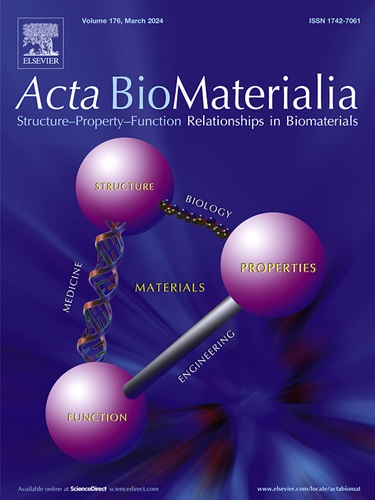1型糖尿病的纳米治疗:从免疫干预到胰岛素输送。
IF 9.6
1区 医学
Q1 ENGINEERING, BIOMEDICAL
引用次数: 0
摘要
1型糖尿病(T1D)是一种慢性自身免疫性疾病,患者的免疫系统错误地攻击并破坏胰腺中产生胰岛素的β细胞,导致绝对胰岛素缺乏。虽然胰岛素替代疗法等传统疗法可以缓解症状,但它们无法从根本上阻止疾病的进展。纳米技术的最新进展在治疗T1D方面取得了重大进展,特别是在恢复免疫耐受和实现精确给药方面。这些创新的纳米疗法使研究人员能够更好地调节免疫反应并保护剩余的β细胞功能。此外,纳米胰岛素递送系统的突破,包括口服、透皮和葡萄糖反应性胰岛素释放系统,为改善T1D患者的血糖控制提供了新的途径。本文通过探讨T1D的发病机制和纳米技术干预免疫耐受的重要性,综述了纳米技术在免疫干预方面的创新策略,包括抗原、抗体和基因治疗,以及纳米胰岛素输送系统,包括迄今为止的成就和相关挑战。开发更有效的纳米治疗T1D的方法前景广阔。意义声明:由于T1D的自身免疫特性和对胰岛素治疗的终身依赖,T1D仍然是一个重大的临床挑战。传统的治疗方法控制症状,但不能解决潜在的免疫功能障碍。这篇综述强调了纳米技术通过整合免疫调节和先进胰岛素递送在T1D治疗中的变革潜力。纳米免疫疗法旨在恢复免疫耐受和保持β细胞功能,解决疾病的根本原因。同时,精确的胰岛素输送系统在减轻患者负担的同时改善了血糖控制。通过介绍目前的进展和仍然存在的挑战,本综述强调了纳米治疗如何能够彻底改变T1D的管理,不仅提供更好的疾病控制,而且提供长期缓解和潜在治愈的途径。本文章由计算机程序翻译,如有差异,请以英文原文为准。

Nano-based therapy for type 1 diabetes: from immuno-intervention to insulin delivery
Type 1 diabetes (T1D) is a chronic autoimmune disease in which the immune system mistakenly attacks and destroys insulin-producing β-cells in the pancreas, causing an absolute insulin deficiency. While traditional treatments, such as insulin replacement therapy, can alleviate symptoms, they fail to halt disease progression fundamentally. Recent advancements in nanotechnology have shown significant progress in treating T1D, particularly in restoring immune tolerance and enabling precise drug delivery. These innovative nano-based therapies allow researchers to better regulate immune responses and protect the remaining β-cell function. Additionally, breakthroughs in insulin delivery using nano-based systems, including oral, transdermal, and glucose-responsive insulin release delivery systems, have provided new avenues for improving glycemic control in T1D patients. Here by exploring the pathogenesis of T1D and the importance of immune tolerance with the intervention of nanotechnology, this review summarizes nano-based innovative strategies in immune intervention, including antigen, antibody and gene therapy, as well as nano-based insulin delivery systems including the to-date achievement and related challenges remaining. Developing more effective nano-based therapeutic approaches for T1D holds big promise.
Statement of significance
T1D remains a significant clinical challenge due to its autoimmune nature and the lifelong dependence on insulin therapy. Traditional treatments manage symptoms but do not address the underlying immune dysfunction. This review underscores the transformative potential of nanotechnology in T1D treatment by integrating immune modulation and advanced insulin delivery. Nano-based immunotherapies aim to restore immune tolerance and preserve β-cell function, tackling the root cause of the disease. At the same time, precise insulin delivery systems offer improved glycemic control with reduced patient burden. By presenting current progress and remaining challenges, this review highlights how nano-based therapies could revolutionize T1D management, offering not only better disease control but also a pathway toward long-term remission and potentially a cure.
求助全文
通过发布文献求助,成功后即可免费获取论文全文。
去求助
来源期刊

Acta Biomaterialia
工程技术-材料科学:生物材料
CiteScore
16.80
自引率
3.10%
发文量
776
审稿时长
30 days
期刊介绍:
Acta Biomaterialia is a monthly peer-reviewed scientific journal published by Elsevier. The journal was established in January 2005. The editor-in-chief is W.R. Wagner (University of Pittsburgh). The journal covers research in biomaterials science, including the interrelationship of biomaterial structure and function from macroscale to nanoscale. Topical coverage includes biomedical and biocompatible materials.
 求助内容:
求助内容: 应助结果提醒方式:
应助结果提醒方式:


